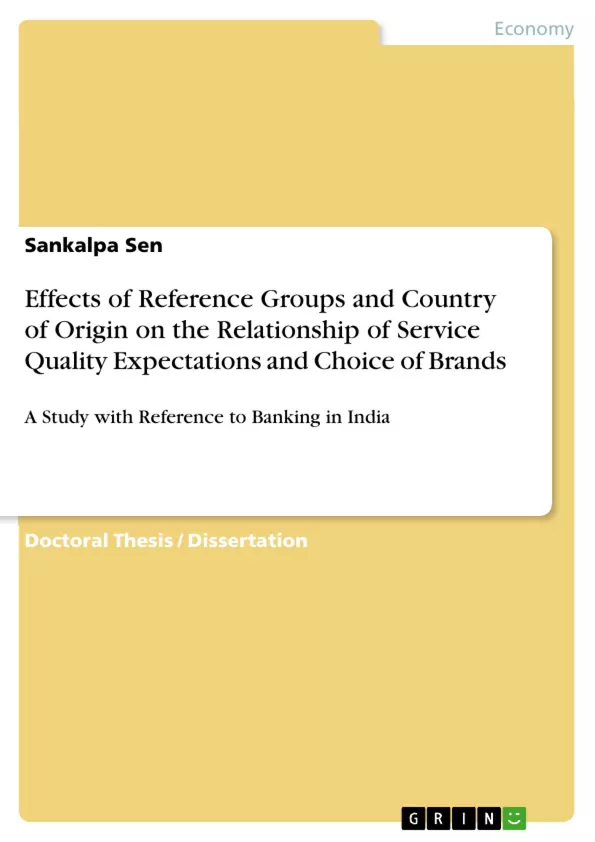Service sector is highly impacted with the fourth industrial revolution. Technology is back bone of most services today. Technology is blurring the characteristics of services like inseparability, perishability and for sure variability. Banking a most transacted service is no different. The relationship of service quality expectations with choice of brand is well established, but in highly competitive environment where general service quality attributes are almost non- variable, it becomes important to understand what other constructs influence the service brand choices. We in this paper attempted to explore how reference groups or country of origin influences the choice of service brands. The service quality expectations are derived from the service perceptions of existing customers and word of mouth. Word of mouth is more impactful when it comes from friends and family or people with likeliness in needs of consumption. This paper attempts to establish the possible relationship of reference groups influence on service expectations and choice particularly focusing on the normative and comparative influence. It also attempts to check if country of origin which is so predominant in goods, influences the brand choice for services.
The empirical study was initiated with a survey conducted on convenient sample across India on questions developed from marketing scales relating to the construct of service expectations, reference group influence, country of origin of two pre- tested banks having most mind share, one a private player another a foreign bank operating in India and lastly the choice of brands amongst the two. The respondents had to rate both the banks, private and foreign, so that the perceptions can be dissected. To analyze SPSS was used to supplement the descriptive statistics with the theory of moderation and mediation to gauge the kind of influence several reference group factors on country of origin have on the established relationship of service expectations and choice of brands.
We noticed through the descriptive study that while assurance and trust continue to weigh high as quality dimensions for most respondents. It is also observed that people make a choice primarily because of “Empathy” dimension of SERVQUAL. Study also revealed that there is a significant relationship between SQE and RGI and which is well moderated by age.
Inhaltsverzeichnis (Table of Contents)
- Chapter 1: Introduction
- 1.1: Background of the Study
- 1.2: Problem Statement
- 1.3: Objectives of the Study
- 1.4: Research Questions
- 1.5: Significance of the Study
- 1.6: Scope and Limitations of the Study
- 1.7: Structure of the Thesis
- Chapter 2: Literature Review
- 2.1: Service Quality
- 2.2: Customer Expectations
- 2.3: Reference Groups
- 2.4: Country of Origin
- 2.5: Brand Choice
- 2.6: Banking Industry in India
- Chapter 3: Research Methodology
- 3.1: Research Design
- 3.2: Population and Sample
- 3.3: Data Collection Method
- 3.4: Data Analysis Techniques
- Chapter 4: Data Analysis and Interpretation
- 4.1: Descriptive Analysis
- 4.2: Hypothesis Testing
- 4.3: Regression Analysis
- Chapter 5: Discussion and Implications
- 5.1: Discussion of Findings
- 5.2: Theoretical Implications
- 5.3: Managerial Implications
Zielsetzung und Themenschwerpunkte (Objectives and Key Themes)
This thesis aims to investigate the influence of reference groups and country of origin on the relationship between service quality expectations and brand choice within the Indian banking industry. It seeks to explore how these factors impact customer preferences and decision-making processes.
- The impact of reference groups on customer service quality expectations.
- The influence of country of origin on customer perceptions of service quality.
- The role of service quality expectations in shaping brand choice decisions.
- The interplay between reference groups, country of origin, service quality expectations, and brand choice.
- The specific application of these findings to the Indian banking context.
Zusammenfassung der Kapitel (Chapter Summaries)
Chapter 1 provides an introduction to the study, outlining the research background, problem statement, objectives, research questions, significance, scope, and limitations. It also establishes the structure of the thesis.
Chapter 2 presents a comprehensive review of relevant literature, exploring concepts such as service quality, customer expectations, reference groups, country of origin, brand choice, and the Indian banking industry. It provides a theoretical framework for the study.
Chapter 3 details the research methodology employed, including the research design, population and sample selection, data collection methods, and data analysis techniques.
Chapter 4 analyzes and interprets the collected data, presenting descriptive statistics, hypothesis testing, and regression analysis results.
Schlüsselwörter (Keywords)
The central themes explored in this thesis are service quality expectations, brand choice, reference groups, country of origin, and the Indian banking industry. It examines the influence of social and national contexts on consumer behavior within this specific market segment.
Frequently Asked Questions
How do reference groups affect banking choices in India?
Reference groups, such as family or peers, significantly influence customer expectations and the final choice of a bank brand through social proof and recommendations.
What role does "Country of Origin" play in service quality?
Customers often perceive service quality differently based on whether a bank is domestic (Indian) or foreign, affecting their trust and brand preference.
What is the main objective of this thesis?
To investigate how social factors (reference groups) and national context (country of origin) impact the relationship between service quality expectations and brand choice in Indian banking.
What research methodology was used?
The study utilized descriptive analysis, hypothesis testing, and regression analysis on data collected from a sample of Indian banking customers.
What are the managerial implications for Indian banks?
Banks should focus on managing their brand image and leveraging social influence to meet the specific quality expectations of different customer segments.
- Quote paper
- Sankalpa Sen (Author), 2017, Effects of Reference Groups and Country of Origin on the Relationship of Service Quality Expectations and Choice of Brands, Munich, GRIN Verlag, https://www.grin.com/document/434334



